Low Blood Pressure
A sudden drop in blood pressure is called low blood pressure. It is defined as a condition in which a person has less than 90mm Hg blood systolic pressure reading or 60 mm Hg for diastolic blood pressure reading. Low blood pressure can leave you feeling unwell, or it can make you feel lightheaded or can even make you faint. Low blood pressure can occasionally endanger life.
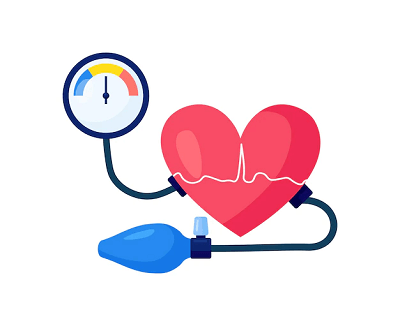
Dehydration and significant medical issues are just a few of the factors that might induce low blood pressure. It's critical to identify the cause of low blood pressure so that, if necessary, it can be addressed.
Low Blood Pressure: What Is It?
The medical term for low blood pressure (less than 90/60) is hypotension. Two numbers represent the reading of the blood pressure.
- Systolic pressure is the pressure in the arteries of human beings during a heartbeat. The first number measures it.
- Diastolic pressure is the pressure in the arteries between the two heartbeats. Pressure presents when the heart is at rest. The second number measures it.
Systolic/diastolic blood pressure should be less than 120/80. Low blood pressure in healthy individuals without symptoms is often not a cause of worry and does not require medical attention. Low blood pressure, however, can be a symptom of a deeper issue, particularly in the elderly, when it may result in insufficient blood flow to the heart, brain, and other essential organs.
Rarely is chronic low blood pressure dangerous in the absence of symptoms. However, health issues might develop when blood pressure suddenly decreases, and the brain isn't receiving enough blood. This could make you feel lightheaded or queasy. Most frequently, sudden reductions in blood pressure happen in people getting up from laying down or sitting to standing.
Postural Hypotension
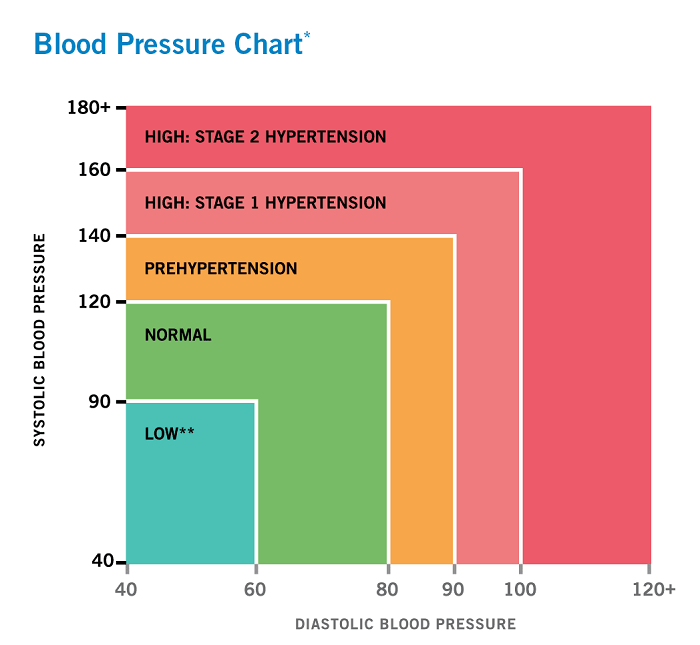
It is also called orthostatic hypotension. It is a type of low blood pressure developed when a person stands after sitting or lying for too long. Postural hypotension usually causes fainting, dizziness, and lightheadedness. The effect of orthostatic hypotension is usually brief, but it can become a more serious health issue in some situations. It is very important to consult a doctor or health professional if a person constantly feels dizziness while standing from a sitting position. The occasional cases of postural hypotension are usually because of lengthy bed rest or body water loss (dehydration). But this brief condition is easily treated. The problem arises in the case of chronic postural hypotension. Therefore, early treatment is advisable.
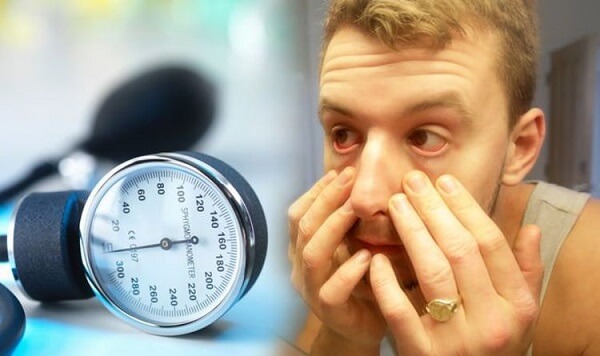
According to estimates, postural hypotension affects 10 to 20 percent of those over 65. With age comes an increased risk of both low and high blood pressure, partly due to aging's natural changes. Additionally, blood flow to the brain and heart muscle decreases as people age, frequently due to plaque formation in blood vessels.
Types Of Low Blood Pressure
- Orthostatic tachycardia (postural hypotension) - As mentioned above, this is a sharp reduction in blood pressure upon getting up from a seated or lying down position. Older people frequently have this kind of low blood pressure. Dehydration, prolonged bed rest, pregnancy, certain medical conditions, and some drugs are some of the causes.
- After-meal hypotension - After eating, this decline in blood pressure happens one to two hours later. Older persons are most likely to be affected, particularly those with high blood pressure or autonomic nervous system disorders, including Parkinson's disease. Small, low-carb meals, increased water consumption, and abstinence from alcohol may all assist in lessening symptoms.
- Hypotension with neural mediation - This is a dip in blood pressure that occurs after prolonged standing. Young people and children are most commonly impacted by low blood pressure. A breakdown in the brain-heart connection might cause it.
- Orthostatic hypotension together with multiple system atrophy - This uncommon condition, also known as Shy-Drager syndrome, affects the neurological system that regulates involuntary processes, including blood pressure, heart rate, respiration, and digestion. When you're lying down, it's linked to having high blood pressure.
Symptoms
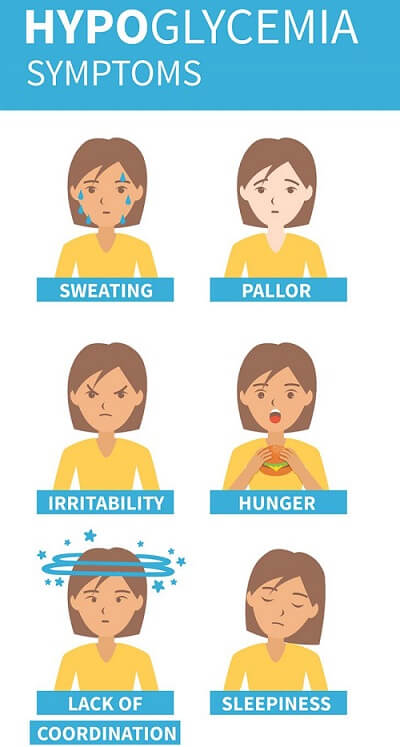
Symptoms Of Low Blood Pressure (Hypotension)
- Diminished or blurred eyesight
- Unsteadiness or faintness
- Fainting
- Fatigue
- Difficulty focusing
- Nausea
When blood pressure decreases unexpectedly or is accompanied by symptoms, it may indicate an underlying health issue for some people.
It can be harmful when blood pressure suddenly drops. Even a little fluctuation in blood pressure, such as going from 110 mm Hg to 90 mm Hg, might result in fainting and dizziness. Additionally, large dips might be fatal, like those brought on by uncontrollable bleeding, serious infections, or allergic responses.
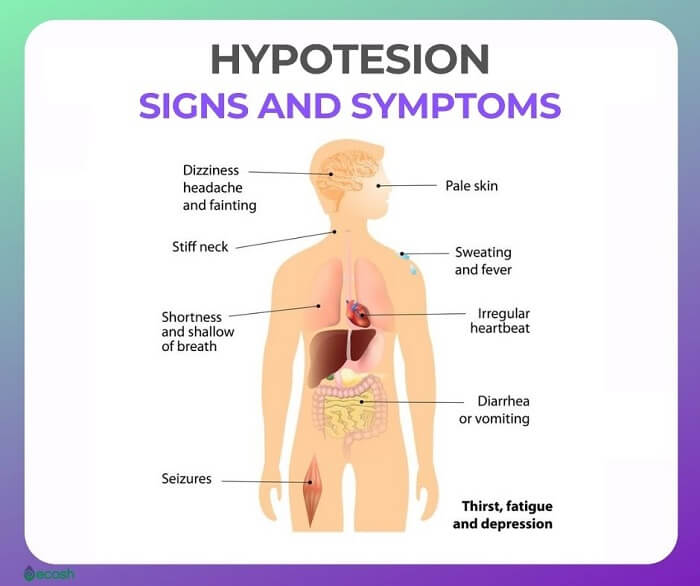
The condition known as shock can result from extremely low blood pressure.
Shock symptoms are as follows;
- Confusion, particularly in the elderly
- Clammy, frigid skin
- Reduction in skin color (pallor)
- Shallow, rapid breathing
- Weak and rapid heartbeat
- Whenever to visit a doctor
You should seek emergency medical attention if you exhibit shock or extremely low blood pressure (hypotension).
Only until symptoms occur do, most medical professionals consider blood pressure to be too low. Spending too much time in the sun or a hot tub are just two of the numerous factors that might result in occasional, mild dizziness or lightheadedness. To receive the proper diagnosis, it's crucial to see a healthcare professional.

Your doctor may examine you during routine checks if you routinely have low blood pressure readings but are otherwise healthy. Keeping track of your symptoms, when they happen, and what you were doing at the time might be beneficial.
Reasons For Daily Variations in Blood Pressure
- Body placement
- Breathing
- Food and beverage
- Medications
- Physical state
- Stress
- Date and time
Typically, blood pressure is lowest at night and quickly increases when you get up. Specific medical disorders and pharmaceutical use can bring on low blood pressure.
Circumstances That May Result in Low Blood Pressure

The following medical problems can result in low blood pressure:
- Pregnancy - Blood vessels quickly enlarge due to pregnancy-related changes. The adjustments might lower blood pressure. Low blood pressure is typical early in pregnancy (the first 24 weeks). After giving delivery, blood pressure typically recovers to pre-pregnancy levels.
- Conditions of the heart and heart valves - Low blood pressure can be brought on by a heart attack, heart failure, heart valve dysfunction, and an abnormally slow heartbeat (bradycardia).
- Illnesses relating to hormones (endocrine disorders) - Blood pressure can fall with conditions that affect the parathyroid or adrenal glands, such as addison's disease. Hypoglycemia, diabetes, and other conditions can drop blood pressure.
- Dehydration - The blood volume in the body reduces when there is not enough water. Blood pressure may decline as a result of this. Dehydration can be brought on by fever, vomiting, severe diarrhea, using diuretics excessively, and vigorous activity.
- Loss of blood - Blood volume is reduced when there is significant blood loss, such as through an accident or internal bleeding, and this causes a sharp reduction in blood pressure.
- A serious infection (septicemia) - Septic shock is a life-threatening condition and can cause reduction in blood pressure. It usually occurs when an infection in the body enters circulation.
- Significant allergic response (anaphylaxis) - A significant decline in blood pressure is one of the signs of a severe allergic response.
- A diet is lacking in nutrition - Low iron, folate, and vitamin B-12 levels can prevent the body from generating enough red blood cells, which can cause anemia and lower blood pressure.
- Prescription drugs that may lower blood pressure - Low blood pressure can result from taking certain drugs, such as:
- Diuretics, or water tablets, include furosemide (Lasix) and hydrochlorothiazide (Microzide)
- The alpha blockers prazosin (Minipress)
- Beta blockers like propranolol and atenolol (Tenormin) (Inderal, Innopran XL, Hemangeol)
- Parkinson's medication, such as pramipexole (Mirapex) or levodopa-containing medications
- Drugs for erectile dysfunction, such as sildenafil (Revatio, Viagra) or tadalafil (Adcirca, Alyq, Cialis), especially when used with the heart medicine nitroglycerin. Certain kinds of antidepressants (tricyclic antidepressants), such as doxepin (Silenor) and imipramine (Tofranil) (Nitrostat, Nitro-Dur, Nitromist)
Risk Elements
Hypotension risk factors include:
- Age - Blood pressure drops when you stand up or after eating is more common in persons over 65. Hypotension that is neurologically mediated typically affects children and young adults.
- Medications - Low blood pressure risk is increased by several substances, including certain blood pressure medications.
- Certain illnesses - Diabetes, Parkinson's disease, and certain cardiac problems can all raise your risk of low blood pressure.
Complications
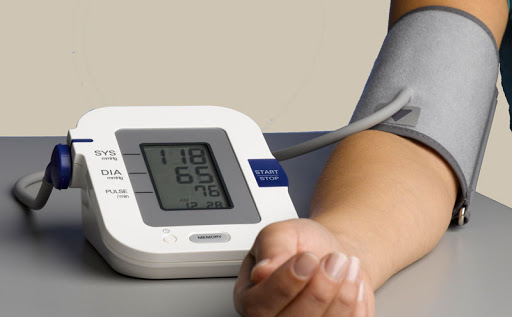
Hypotension, or low blood pressure, may result in the following complications:
- Dizziness
- Weakness
- Fainting
- Damage from falls
- Severe hypotension can lower the body's oxygen levels, harming the heart and the brain.
|








 For Videos Join Our Youtube Channel: Join Now
For Videos Join Our Youtube Channel: Join Now









